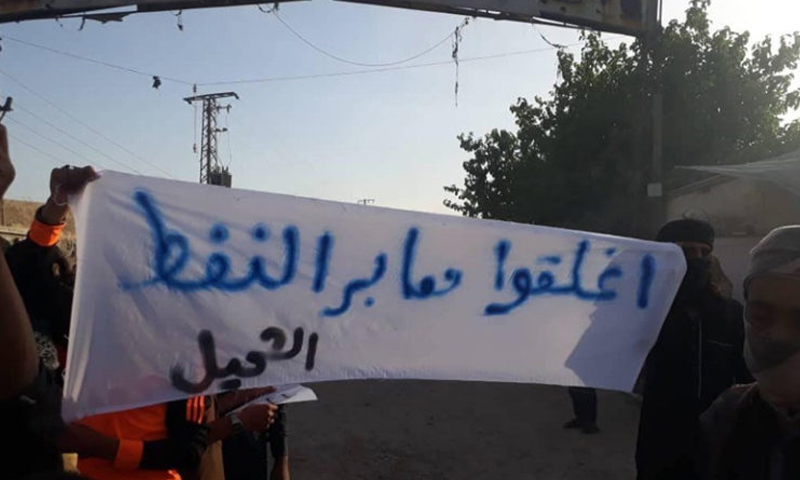



The International Coalition Forces (ICF) led by the United States focus on targeting the water crossings spread on both banks of the Euphrates River in the province of Deir Ezzor. The US-led ICF along with the Syrian Democratic Forces (SDF) attempt to stop smuggling in these areas for fear of contracting the novel coronavirus (COVID-19) from the Syrian regime-held areas, which is crowded with Iranian militias.
The areas of the Kurdish-led Autonomous Administration of North and East of Syria (NES) in Deir Ezzor are linked with the regime-held ones by ten river crossings, which serve vital roles in reviving the latter’s markets in Deir Ezzor, especially crossings related to smuggling oil. All these water crossings have started functioning since the SDF, and the Syrian regime took control over Deir Ezzor, after fighting against the so-called Islamic State (IS) at the end of 2017.
The water crossings in Deir Ezzor play an essential role as transportation links for people and freights. Some water crossings are used for transporting a few civilians on small boats between the two banks of the river. Some water crossings are dedicated to car ferries; car ferries transport goods and fuel between the two banks.
The most essential crossings in Deir Ezzor are the following:
Al-Muhaimidah – Ayyash Crossing is almost the only crossing between the “SDF” and the Syrian regime in the western countryside of Deir Ezzor.
The eastern countryside of Deir Ezzor includes ten river crossings between the SDF and the Syrian regime spread on both banks of the Euphrates River: Jadded Ekedat- al-Muhasan Crossing, Jadeed Bakkarah-Toub Crossing, Sobha-Buleil Crossing, Basirah- Se’alow Crossing, al-Shuhayl- Boqruss Crossing, Hawaij- al-Mayadeen Crossing, Diban-Mahkan Crossing, al-Tayaneh- al-Quriyah Crossing, Darnaj-al-Asharah Crossing, al-Jurzi-Sabikhan Crossing.
The most important crossings are the al-Shuhayl and Hawaij crossings, which experienced intensified security campaigns by the SDF and the ICF. Smuggling is active between the two crossings connecting the Syrian regime and the SDF; goods and oils are smuggled from the SDF-held areas to the Syrian-regime regions, in addition to the entering of the construction materials and foodstuffs from the latter.
Abu Dhiyab, one of the workers between the two banks of the Hawaij-al-Mayadeen crossing, informed Enab Baladi, in a telephone call, on the mechanism of work through the crossing. He said that he is transporting foodstuffs from the Syrian regime-held areas at the al-Mayadeen area via his truck. Then, his fully loaded truck is carried by ferry, heading to the markets of the SDF in the eastern countryside of Deir Ezzor.
Abu Dhiyab pointed out that, despite the establishment of a curfew, there are still some smugglers performing transfers between the two banks of the river. Abu Dhiyab stressed that no medical examinations are taking place at the crossing points of entry and exit.
He added that the transport of iron and construction materials to the “SDF” areas was mostly active, noting that the transportation of goods has decreased because the SDF imposed a curfew in the area as part of the precautionary measures to confront the “coronavirus.”
Due to the widespread of coronavirus (Covid-19) and amid fear of contagion from the regime-controlled areas, the NES-held Kurdish regions have imposed restrictions on the movement within its territories, and closed all its crossings with the regime and with the Kurdistan Region of Iraq.
According to the sources of Enab Baladi, the most active crossing in the area is al-Shuhayl, which witnesses fuel smuggling to the areas of the regime.
Enab Baladi obtained phone numbers of two people smuggling construction materials (cement, iron, industrial materials) from the Syrian regime-controlled areas in exchange for fuel from the SDF-held areas through al-Shuhayl Crossing.
Enab Baladi asked these two people how they work and who stand behind them during the smuggling operations, but they refused to answer for fear of prosecution. They also stressed that they are only intermediaries between people from the SDF and al-Qatirji group, which provides the Syrian regime with crude oil.
Al-Qatirji family name emerged in the past few years as a significant broker between the so-called IS (during its control on the oil fields) and the SDF on the one hand, and the Syrian regime, on the other hand, to transport fuel from the eastern region.
The US Department of the Treasury imposed sanctions on Syria’s “al-Qatirji” oil company in September 2018, for it played the role of mediator between the Syrian regime and the IS group, by facilitating oil shipments between the two parties, in addition to providing the regime with fuel, weapons and financial support.
As for the SDF, a leader in the SDF-linked “Deir Ezzor Military Council,” called Khalil al-Wahsh, is accused of coordinating with a person from the town of Boqruss working for “al-Qatirji,” at the al-Shuhayl Crossing.
On 24 March, an SDF patrol besieged the al-Shuhayl Crossing, with the support of the ICF, which was conducting air patrols to monitor movement between the two banks of the river as part of precautionary measure against the coronavirus. However, several smugglers did not adhere to the “SDF” procedures and resumed their smuggling operations through the crossing.
As a result, the US forces set up a roadblock of military vehicles at the crossing and declared its complete closure for the first time. Thus, the US forces are depriving the regime of crude oil in its areas, where there is already a shortage of fuel.
To reinforce the US move, the commander of the SDF-affiliated “Deir Ezzor Military Council,” Abu Khawla al-Dayri ( Ahmad Hamid al-Khubayl), threatened to harshly punish smugglers who violate the curfew in the eastern countryside of Deir Ezzor, stressing the control of the crossings and checkpoints deployed in the area.
if you think the article contain wrong information or you have additional details Send Correction